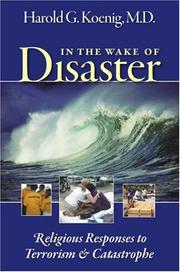| Listing 1 - 2 of 2 |
Sort by
|

ISBN: 128326028X 9786613260284 1599471884 9781599471884 1932031995 9781932031997 Year: 2006 Publisher: Philadelphia : Templeton Foundation Press,
Abstract | Keywords | Export | Availability | Bookmark
 Loading...
Loading...Choose an application
- Reference Manager
- EndNote
- RefWorks (Direct export to RefWorks)
In a timely book with a powerful and persuasive message, Dr. Harold G. Koenig addresses federal, state, and local government policy leaders, urging them to more fully integrate religious organizations into the formal disaster response system, and he then provides recommendations on how this can effectively be done. Koenig also advocates faith communities and organizations to learn more about the role they can play in responding to disasters and terrorism.The chaotic aftermath of Hurricane Katrina made extraordinarily clear the gaps in the United States' disaster polici
Church work with disaster victims --- Disasters --- Disaster relief --- Religious aspects. --- Psychological aspects.
Book
ISBN: 9780199950447 019995044X 9780199916030 0199916039 9780199916023 0199916020 9780199916092 0199916098 Year: 2012 Publisher: New York : Oxford University Press,
Abstract | Keywords | Export | Availability | Bookmark
 Loading...
Loading...Choose an application
- Reference Manager
- EndNote
- RefWorks (Direct export to RefWorks)
The global humanitarian movement, which originated within Western religious organizations in the early nineteenth century, has been of most important forces in world politics in advancing both human rights and human welfare. While the religious groups that founded the movement originally focused on conversion, in time more secular concerns came to dominate. By the end of the nineteenth century, increasingly professionalized yet nominally religious organization shifted from reliance on the good book to the public health manual. Over the course of the twentieth century, the secularization of humanitarianism only increased, and by the 1970s the movement's religious inspiration, generally speaking, was marginal to its agenda. However, beginning in the 1980s, religiously inspired humanitarian movements experienced a major revival, and today they are virtual equals of their secular brethren.From church-sponsored AIDS prevention campaigns in Africa to Muslim charity efforts in flood-stricken Pakistan to Hindu charities in India, religious groups have altered the character of the global humanitarian movement. Moreover, even secular groups now gesture toward religious inspiration in their work. Clearly, the broad, inexorable march toward secularism predicted by so many Westerners has halted, which is especially intriguing with regard to humanitarianism. Not only was it a highly secularized movement just forty years ago, but its principles were based on those we associate with "rational" modernity: cosmopolitan one-worldism and material (as opposed to spiritual) progress. How and why did this happen, and what does it mean for humanitarianism writ large? That is the question that the eminent scholars Michael Barnett and Janice Stein pose in Sacred Aid, and for answers they have gathered chapters from leading scholars that focus on the relationship between secularism and religion in contemporary humanitarianism throughout the developing world. Collectively, the chapters in this volume comprise an original and authoritative account of religion has reshaped the global humanitarian movement in recent times.
Humanitarian assistance --- Church work with disaster victims --- Social Welfare & Social Work --- Social Sciences --- Social Welfare & Social Work - General --- Humanitarian assistance. --- Church work with disaster victims. --- Church and disaster relief --- Disaster relief and the church --- Disaster victims --- Humanitarian aid --- International relief
| Listing 1 - 2 of 2 |
Sort by
|

 Search
Search Feedback
Feedback About UniCat
About UniCat  Help
Help News
News